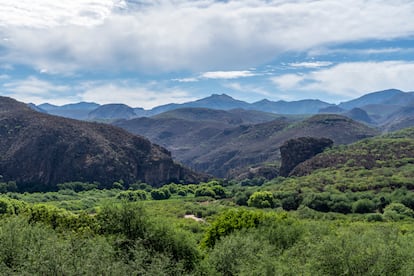The ‘white gold’ dream: Why Mexico wants to control lithium exploitation
The government has earmarked the mineral as a national strategic resource and is planning to deny new concessions to private companies


The administration of Mexican President Andrés Manuel López Obrador has decided to take new steps over the control of lithium in Mexico with the intention of turning into a strategic resource like oil. This is what the president has laid out in his energy reform bill, which has been submitted to Congress for approval and which will depend on support from the opposition Institutional Revolutionary Party (PRI) to be passed into law.
On the undercard of the energy reform bill, which is a constitutional-level proposal, other regulations will be included such as the Mining Law, which will provide more benefits for private companies. “We have to protect this coveted mineral. It belongs to the nation, we cannot allow it to pass into the hands of corporations or hegemonic powers,” López Obrador said of lithium on October 13 in his daily press briefing. In doing so, the president lent his own voice to the enthusiasm of several of his civil servants, who have gone so far in recent months as to call lithium “the oil of the future” and “white gold.”
This light mineral, which fizzes on contact with water, is used in the electromobility sector, in batteries for electronic equipment, in energy-storage systems, anti-depressant medication and even in the nuclear industry. According to the government of Chile, the region’s biggest lithium producer, global demand for “white gold” is set to grow by 80% by 2030 and Mexico has no intention of missing the party. Even less so after Anglo-Canadian exploration company Bacanora Minerals discovered the largest lithium deposit in the world in Bacadéhuachi, in the state of Sonora, in the north of the country.
The site, which measures the equivalent of 100,000 soccer pitches, contains estimated reserves of 243 million tons of minerals embedded in rocks and clay. The discovery was swiftly reported in industry media and Bacanora’s stock value shot up after the announcement of a 50-year concession to the company, which a few years ago was bought out by its majority shareholder, Chinese giant Gangfeng, one of the biggest manufacturers of electric batteries in the world.
It’s being touted as the gold of the future but nobody understands itMartín Obaya, researcher
Given this panorama and under the protection of its energy sovereignty, the Mexican government has decided to batten its hatches with respect to lithium, even before being appraised of an approximate calculation of the quantity of minerals the country is sitting on. “An important point is what appears in the transitory: all previous contracts will be respected under the terms to which they were agreed, but the future part is what is most important, which is what is covered by the Mexican state,” says Gonzalo Monroy, director of Mexican energy consultancy GMEC.
As López Obrador stated, the energy reform initiative will allow the government to stop handing out new concessions for lithium exploration. Additionally, the text states that current concessions will be respected, as long as there are “existing exploration records signed off on by the Secretariat of Economy.” What remains unclear is what will happen to concessions in the hands of the small, mostly Canadian, firms that as yet have not commenced exploration activities. “It is also inconvenient to be the only private operator when the other is the state,” says an energy sector expert who preferred to remain anonymous. “Everybody in the business world is worried about electricity reform.”
Currently, there are 36 lithium exploration concessions in Mexico, of which only 27 are active, all of which are controlled by three foreign companies including Gangfeng, according to a report compiled by GeoComunes, The Mexican Network of People Affected by Mining and Mining Watch Canada. The Sonora deposit is the most advanced project in the country. Its developers estimate that the new plant will commence operations in 2023 and production in the first year will reach around 17,000 tons, rising to 35,000 tons over the following few years with an investment of $2 billion (€1.72 billion) required to bring the project to fruition. “I believe the government is limiting the conditions under which exploration is being carried out, with the idea of reaping greater benefits for itself,” says Martín Obaya, a researcher at Argentina’s National Scientific and Technical Research Council and the School of Business and Economics at the National University of General San Martín in Buenos Aires Province. “At times the technical difficulty of exploiting lithium is underestimated, but it is also relevant,” Obaya adds.
The researcher notes that one of the decisive elements is the cost of extraction and the profitability of the concessions. “If a company intends to work a concession with an operating cost of $10,000 [€8,590] per ton and the market value is $12,000 [€10,310] it is economically unviable, that is why it is important to find out as soon as possible what kind of deposits there are in Mexico, because the success of any exploitation depends upon that information.”
Although initially some members of López Obrador’s government were inclined toward nationalizing lithium, the administration’s rhetoric has been softening in an attempt to attract investors interested in developing public-private projects in the future. Without the technology and know-how of the private sector, Mexico’s desire to gain a foothold in the lithium business is likely to be frustrated, as had been the case in Bolivia, which remains incapable of producing lithium on a large scale 13 years after its first foray into the sector. “López Obrador included lithium in the reform because it’s an easy sell. It’s being touted as the gold of the future but nobody understands it and the private sector isn’t interested in it because Mexico isn’t currently producing it,” says Obaya.
Government sources consulted by EL PAÍS have yet to concur as to whether Mexico will focus on the production of lithium or on the development of batteries for the electric automobile industry. “[State-owned petroleum company] Pemex and the Federal Electricity Commission’s state-owned companies could develop the entire lithium industry, but we have to take it step by step,” says Senator Alejandro Armenta, of the López Obrador’s governing Moderna party, who was the prime mover behind the first draft bill in favor of nationalizing lithium. It also remains unclear if the law would oblige private companies to sell extracted lithium to the state, or in contrast, if they would be used for export, as is currently the case among Mexico’s mining companies with other products.
If Chile, Bolivia and Argentina have the capacity to exploit it, why not us?Senator Alejandro Armenta
Some opposition members view the electricity reform as a backwards step and the proposal regarding lithium as insufficient. “There has to be regulation, not limitation. Lay the foundations for participation but in a genuinely free market and not one monopolized by the state,” says Senator Indira Kempis of the social-democratic Citizens’ Movement.
The reform will leave the door open for the creation of “public, social and private companies,” which can develop the industry in the future. “Without a doubt, it is a great opportunity for Mexico to become one of the world leaders in the industrial development of lithium,” Senator Armenta adds. “If Chile, Bolivia and Argentina have the capacity to exploit it, why not us?”
In the view of some analysts, Morena’s vision falls short of what is required. “The steps the government is taking at the moment are treating lithium as though it was purely a commodity; they are not thinking in terms of it being a national industry with a global clientele, within a North American integration,” says Gonzalo Monroy. “They are missing an opportunity to integrate Mexico in the global supply chains with the US, Asia and Canada.” With the trade agreement between Mexico, the US and Canada (T-MEC) coming into effect, lithium exploitation has taken on greater significance, in view of the need to ensure a supply chain with North America.
Within three years, automobiles manufactured in the three countries must contain at least 75% regionally produced components if they are to be sold without duties. This includes lithium batteries, which could become a profitable business for Mexico as a large-scale producer of electric vehicles. “It would be a huge bonus for Mexican lithium to be incorporated into this industry,” says Kempis. In 2018, Gangfeng signed an agreement to build a battery recycling plant in Mexico to supply minerals for Tesla Motors, owner of the largest electric vehicle factory in the world in Nevada, 870 miles from Sonora.
“It is a more-coveted mineral than others, on which the development of new technologies is going to depend and this is something that affects the next generations,” López Obrador told the media. Beyond the discursive plan, Mexico can still only dream of lithium. Exploration, while promising, at the moment only looks good on paper. As is the case with other minerals, the countries that sit on the greatest deposits are not necessarily those with the best-developed industries to exploit them. In that lies the greatest challenge Mexico will face in the white gold rush.
Tu suscripción se está usando en otro dispositivo
¿Quieres añadir otro usuario a tu suscripción?
Si continúas leyendo en este dispositivo, no se podrá leer en el otro.
FlechaTu suscripción se está usando en otro dispositivo y solo puedes acceder a EL PAÍS desde un dispositivo a la vez.
Si quieres compartir tu cuenta, cambia tu suscripción a la modalidad Premium, así podrás añadir otro usuario. Cada uno accederá con su propia cuenta de email, lo que os permitirá personalizar vuestra experiencia en EL PAÍS.
¿Tienes una suscripción de empresa? Accede aquí para contratar más cuentas.
En el caso de no saber quién está usando tu cuenta, te recomendamos cambiar tu contraseña aquí.
Si decides continuar compartiendo tu cuenta, este mensaje se mostrará en tu dispositivo y en el de la otra persona que está usando tu cuenta de forma indefinida, afectando a tu experiencia de lectura. Puedes consultar aquí los términos y condiciones de la suscripción digital.








































